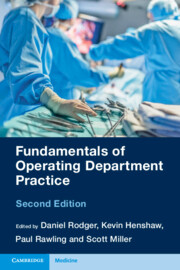Book contents
- Fundamentals of Operating Department Practice
- Fundamentals of Operating Department Practice
- Copyright page
- Contents
- Contributors
- Foreword
- Chapter 1 The Caring Perioperative Practitioner
- Chapter 2 Evidence-Based Operating Department Practice
- Chapter 3 Healthcare Ethics and Professional Regulation in Operating Department Practice
- Chapter 4 Operating Department Practice and the Law
- Chapter 5 Health and Safety in the Perioperative Environment
- Chapter 6 Fundamentals of Operating Department Design
- Chapter 7 Fundamentals of Infection Prevention and Control in the Operating Department
- Chapter 8 Fundamentals of Cardiovascular Physiology
- Chapter 9 Recognition and Interpretation of the Electrocardiogram
- Chapter 10 Fundamentals of Respiratory Physiology
- Chapter 11 Introduction to General Anaesthesia
- Chapter 12 Fundamentals of Airway Management
- Chapter 13 Artificial Ventilation
- Chapter 14 Management of Perioperative Medical Emergencies
- Chapter 15 Total Intravenous Anaesthesia
- Chapter 16 Fundamentals of Basic Patient Monitoring
- Chapter 17 Haemodynamic Monitoring
- Chapter 18 Fundamentals of Regional Anaesthesia
- Chapter 19 Fundamentals of the Anaesthetic Machine
- Chapter 20 Anaesthetic Breathing Systems
- Chapter 21 Pharmacological Agents in Anaesthetic Practice
- Chapter 22 Fundamentals of Emergency Obstetric Care
- Chapter 23 Care of the Bariatric Patient
- Chapter 24 Fundamentals of Decontamination and Sterilisation
- Chapter 25 Management and Use of Medical Equipment
- Chapter 26 Fundamentals of the Surgical Scrub Role
- Chapter 27 Fundamentals of Patient Positioning for Surgery
- Chapter 28 Fundamentals of Perioperative Thermoregulation
- Chapter 29 Fundamentals of Fluid and Electrolyte Balance during Surgery
- Chapter 30 The Physiology of Blood and Its Administration
- Chapter 31 Fundamentals of Wound Healing, Dressings, and Drains
- Chapter 32 Understanding Sutures and Skin Closure
- Chapter 33 Perioperative Care of the Paediatric Patient
- Chapter 34 Perioperative Pain Management
- Chapter 35 Recovery of Patients from Anaesthesia and Surgery
- Chapter 36 The Fundamentals of Emergency Resuscitation
- Chapter 37 Human Factors, Ergonomics, and Non-technical Skills
- Chapter 38 Understanding Intraoperative Death
- Chapter 39 Extended and Advanced Roles in Perioperative Practice
- Index
- References
Chapter 3 - Healthcare Ethics and Professional Regulation in Operating Department Practice
Published online by Cambridge University Press: 18 August 2022
- Fundamentals of Operating Department Practice
- Fundamentals of Operating Department Practice
- Copyright page
- Contents
- Contributors
- Foreword
- Chapter 1 The Caring Perioperative Practitioner
- Chapter 2 Evidence-Based Operating Department Practice
- Chapter 3 Healthcare Ethics and Professional Regulation in Operating Department Practice
- Chapter 4 Operating Department Practice and the Law
- Chapter 5 Health and Safety in the Perioperative Environment
- Chapter 6 Fundamentals of Operating Department Design
- Chapter 7 Fundamentals of Infection Prevention and Control in the Operating Department
- Chapter 8 Fundamentals of Cardiovascular Physiology
- Chapter 9 Recognition and Interpretation of the Electrocardiogram
- Chapter 10 Fundamentals of Respiratory Physiology
- Chapter 11 Introduction to General Anaesthesia
- Chapter 12 Fundamentals of Airway Management
- Chapter 13 Artificial Ventilation
- Chapter 14 Management of Perioperative Medical Emergencies
- Chapter 15 Total Intravenous Anaesthesia
- Chapter 16 Fundamentals of Basic Patient Monitoring
- Chapter 17 Haemodynamic Monitoring
- Chapter 18 Fundamentals of Regional Anaesthesia
- Chapter 19 Fundamentals of the Anaesthetic Machine
- Chapter 20 Anaesthetic Breathing Systems
- Chapter 21 Pharmacological Agents in Anaesthetic Practice
- Chapter 22 Fundamentals of Emergency Obstetric Care
- Chapter 23 Care of the Bariatric Patient
- Chapter 24 Fundamentals of Decontamination and Sterilisation
- Chapter 25 Management and Use of Medical Equipment
- Chapter 26 Fundamentals of the Surgical Scrub Role
- Chapter 27 Fundamentals of Patient Positioning for Surgery
- Chapter 28 Fundamentals of Perioperative Thermoregulation
- Chapter 29 Fundamentals of Fluid and Electrolyte Balance during Surgery
- Chapter 30 The Physiology of Blood and Its Administration
- Chapter 31 Fundamentals of Wound Healing, Dressings, and Drains
- Chapter 32 Understanding Sutures and Skin Closure
- Chapter 33 Perioperative Care of the Paediatric Patient
- Chapter 34 Perioperative Pain Management
- Chapter 35 Recovery of Patients from Anaesthesia and Surgery
- Chapter 36 The Fundamentals of Emergency Resuscitation
- Chapter 37 Human Factors, Ergonomics, and Non-technical Skills
- Chapter 38 Understanding Intraoperative Death
- Chapter 39 Extended and Advanced Roles in Perioperative Practice
- Index
- References
Summary
In acknowledging that ethics should be regarded as the cornerstone of healthcare practice and the significance of professional regulation for healthcare practitioners providing patient care, it is vital to develop an understanding of how and why this is the case. This chapter has been written to support all perioperative practitioners in developing this knowledge in the context of the operating theatre. The chapter includes discussion of some of the key moral theories and frameworks that may be used to guide reflective, ethical decision making before moving on to consider the role of professional codes and regulation in prescribing and enforcing standards of professional conduct and directing ethical decision making.
- Type
- Chapter
- Information
- Fundamentals of Operating Department Practice , pp. 15 - 27Publisher: Cambridge University PressPrint publication year: 2022

